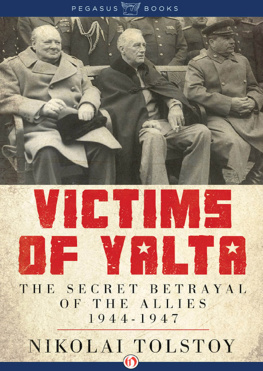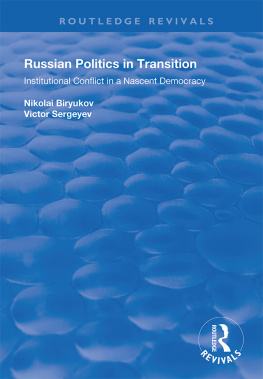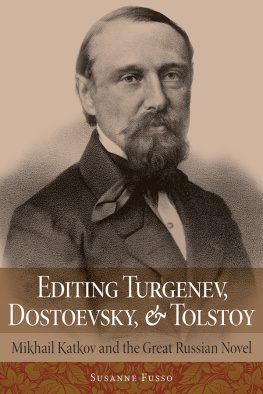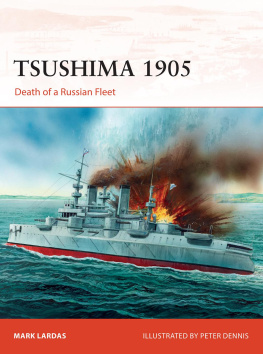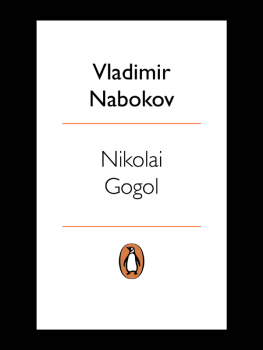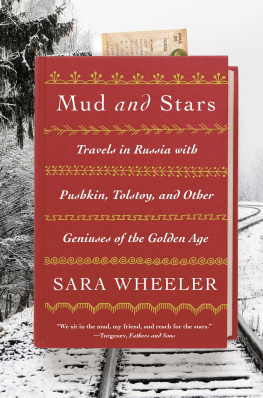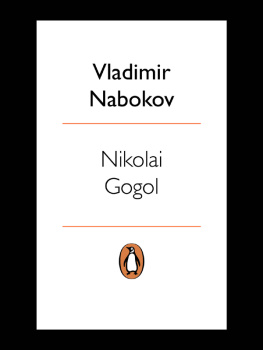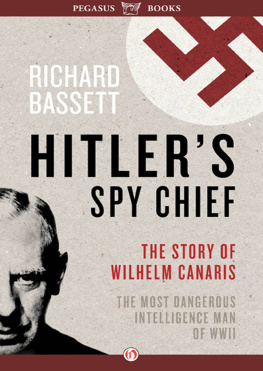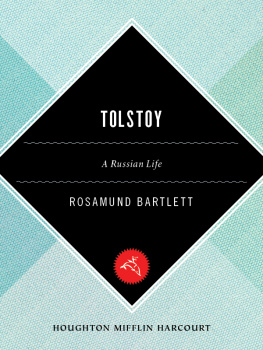Nikolai Tolstoy - Victims of Yalta: The Secret Betrayal of the Allies: 1944-1947
Here you can read online Nikolai Tolstoy - Victims of Yalta: The Secret Betrayal of the Allies: 1944-1947 full text of the book (entire story) in english for free. Download pdf and epub, get meaning, cover and reviews about this ebook. year: 2012, publisher: Pegasus, genre: History. Description of the work, (preface) as well as reviews are available. Best literature library LitArk.com created for fans of good reading and offers a wide selection of genres:
Romance novel
Science fiction
Adventure
Detective
Science
History
Home and family
Prose
Art
Politics
Computer
Non-fiction
Religion
Business
Children
Humor
Choose a favorite category and find really read worthwhile books. Enjoy immersion in the world of imagination, feel the emotions of the characters or learn something new for yourself, make an fascinating discovery.
- Book:Victims of Yalta: The Secret Betrayal of the Allies: 1944-1947
- Author:
- Publisher:Pegasus
- Genre:
- Year:2012
- Rating:3 / 5
- Favourites:Add to favourites
- Your mark:
- 60
- 1
- 2
- 3
- 4
- 5
Victims of Yalta: The Secret Betrayal of the Allies: 1944-1947: summary, description and annotation
We offer to read an annotation, description, summary or preface (depends on what the author of the book "Victims of Yalta: The Secret Betrayal of the Allies: 1944-1947" wrote himself). If you haven't found the necessary information about the book — write in the comments, we will try to find it.
One of the most tragic episodes of World War IIthe forced repatriation of two million Russian POW s to certain doom.
8 pages of black & white photographsVictims of Yalta: The Secret Betrayal of the Allies: 1944-1947 — read online for free the complete book (whole text) full work
Below is the text of the book, divided by pages. System saving the place of the last page read, allows you to conveniently read the book "Victims of Yalta: The Secret Betrayal of the Allies: 1944-1947" online for free, without having to search again every time where you left off. Put a bookmark, and you can go to the page where you finished reading at any time.
Font size:
Interval:
Bookmark:

Victims of Yalta
Nikolai Tolstoy


To the Memory of the Victims

INTRODUCTION
That well over two million Russians were handed over to Stalin in the years 19447 by the Western Allies, and that the fate accorded to almost all of them was terrible, has been known to an increasingly large public for a number of years. At first the knowledge was confined largely to migr circles directly concerned with the tragedy; more recently some well-researched studies have appeared in English.
The truth is, however, that despite the existence of an array of published work, much of it scholarly and well informed, only a small part of the story has seen the light of day. For a start, much of the most crucial material remained inaccessible even to the most recent writers. Under the British thirty-year ruling, state papers are gradually released annually, with the result that before the publication of the present work no historian had been able to use documents extending from the Potsdam Conference in July 1945 to the end of 1947. These constitute the evidence for half the period in question, and are clearly essential to a full understanding of the story. Numerous surviving participants, many occupying key positions at the time, have remained until now uninterviewed; in many cases their testimony must seriously alter the accepted picture.
Perhaps the clearest way of indicating what work yet remained to be done is to explain that some three-quarters of the material of Victims of Yalta has never before appeared in print. The circumstances that led so many Russians to fall into the hands of the Germans; repatriation operations conducted from Norway, North Africa, France, Belgium, Holland and neutral countries; the question of British and American infraction of the Geneva Convention; the Soviet side of operations, conducted by the NKVD and SMERSH; the fate of the returned Russians; all these are for the first time described in detail.
A crucial chapter of Victims of Yalta examines a sinister episode, which, most astonishing of all, has been entirely overlooked by historians. Thousands of Tsarist fugitives, who had never lived in Soviet Russia, who had fled their country in 1919 as allies of the British and Americans and who were not in consequence covered by the Yalta Agreement, were surrendered to SMERSH in Austria under an arrangement so secret that exceptional measures are still employed to suppress the evidence.
The story of the forced repatriation is still a living issue. Lord Avon, who as Anthony Eden was responsible for initiating the whole policy, wrote frequently to the author to justify the measure, but equally persistently declined to answer specific questions on crucial issues. Only one Foreign Office official intimately concerned with the arrangements in 19445 agreed to speak to the author, and then only to explain that he had suffered a fit of amnesia covering exactly that period. The remainder declined to be interviewed, and the author only learned later the pretext for this silence. This was that it is the Foreign Secretary who authorises policy, and it is for the civil servants merely to carry it out. Whatever may be thought of this argument in general terms, it can have little application to the subject of this history.
Halfway through the period of forced repatriation came the British General Election of July 1945. Ernest Bevin succeeded Eden as Foreign Secretary and, with a view to considering whether the policy would continue, he asked for a full account of all measures taken so far. The resultant report stated that no resort has ever had to be made to violent measures in compelling Russians to return home. It was on the basis of this falsehood that Bevin reluctantly agreed to continue operations for a further year and a half, and successfully pressed the Americans to adopt the same policy. Until now the activities of anonymous civil servants have been largely ignored, interest being almost exclusively concentrated on the politicians and their decisions. The full story reveals the power possessed by these shadowy figures, and the use they made of it.
Orwells strictures were undoubtedly valid. British reporters, with or without editorial prompting, were reluctant to print news unfavourable to the Soviet system, though few went as far as the liberal A. J. Cummings, whose article in the News Chronicle (3 October 1944) declared that: With the exception of one man, all these Russians are eager to get back to their own land.
There were other influences at work besides the widespread cult of Uncle Joe. When a number of terrified Russians held in camps in Britain committed suicide, Patrick Dean of the Foreign Office noted that, if the news got out, it might possibly cause political trouble, urging that the Foreign Office should speak to the News Department with a view to doing all that is possible to avoid publicity, (Guy Burgess, subsequently unmasked as a traitor, was working in the Foreign Office News Department at that time, and it may be imagined that he was not unreceptive to Deans suggestion.)
What was referred to, of course, was the realisation that large sections of the British public would revolt against the application of brutal measures to compel the return of unwilling Russians, particularly large numbers of women and children. This was frankly admitted by another official, John Galsworthy, when it came to a question of people it was not
But such candour was exceptionaland for a purpose. The general Foreign Office view, expressed on numerous occasions in 19445, was that operations must be carefully concealed from the British public, lest there be a scandal with talk about irregular procedure, cheating people into accepting repatriation to the USSR etc. This had to be avoided at all costs.
All this contrasts strangely with what apologists for the Foreign Office decision assert today. In a House of Lords debate on the subject on 17 March 1976, Lord Hankey claimed that the Government would have been subjected to an irresistible storm of criticism had it attempted to retain Russians unwilling to returnbecause this would have imperilled the return of British prisoners liberated by the Red Army.
This leads to the essential point: would Stalin have considered holding such liberated British and American prisoners hostage for the return of the millions of Soviet citizens held in Western Europe? This consideration will be discussed at length in Victims of Yalta. At this stage it will suffice to say that there exists no evidence that anyone in the Foreign Office at the time feared such a contingency. True, Stalin might have been even less co-operative than he was in implementing the provisions of the Yalta Agreement, but the worst the Foreign Office envisaged was that Britons in Red Army hands might continue for a few weeks to return home by sea from Odessa instead of overland through Germany. That Stalin contemplated retaining them as a quid pro quo was never considered by Eden or his advisers. Furthermore, striking evidence will be brought forward for the first time to show that, if Stalin ever did contemplate such a move, it was to reject it.
For the first time, too, it will be shown in detail how very different was United States policy on the matter. The State Department delayed acceptance of the principle of forced repatriation for months after the British had conceded it. It then reluctantly gave in, but was so revolted at the relatively minor scenes of bloodshed that ensued that it temporarily abandoned the policy. Finally, under strong British pressure, a few hundred Russians who had served in the German Army were sent back.
Font size:
Interval:
Bookmark:
Similar books «Victims of Yalta: The Secret Betrayal of the Allies: 1944-1947»
Look at similar books to Victims of Yalta: The Secret Betrayal of the Allies: 1944-1947. We have selected literature similar in name and meaning in the hope of providing readers with more options to find new, interesting, not yet read works.
Discussion, reviews of the book Victims of Yalta: The Secret Betrayal of the Allies: 1944-1947 and just readers' own opinions. Leave your comments, write what you think about the work, its meaning or the main characters. Specify what exactly you liked and what you didn't like, and why you think so.

